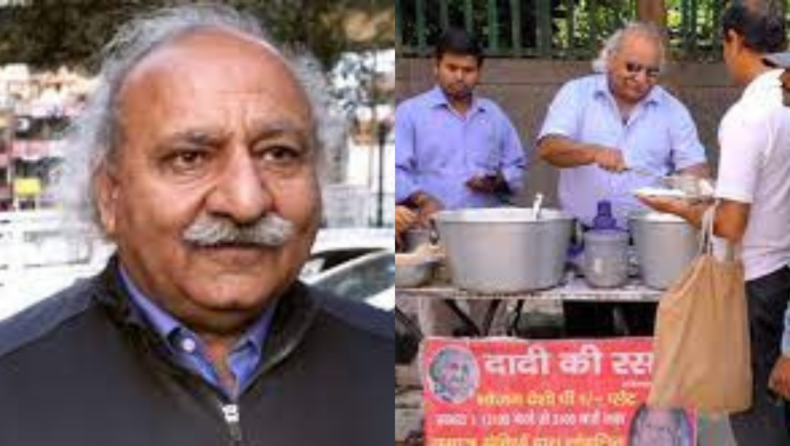‘Dadi Ki Rasoi’ is an initiative started by social worker Anup Khanna in Noida, Uttar Pradesh. Dadi Ki Rasoi provides food to the poor for ₹5 And Clothes for ₹10 quality food to the poor for ₹5 and clothes for ₹10. The start-up is situated in Noida, sector 29, and has gained popularity in the entire NCR.

How Did Dadi Ki Rasoi Commence
Anup Khanna’s mother thought of it in the first place. Once while having her meal, she thought, why not provide food at a low price to those who cannot afford it?
So, if you don’t have the budget to have a one-time meal in a day and want to have good quality food at a price as low as ₹5, Dadi Ki Rasoi is the perfect place for you.
When Did Dadi Ki Rasoi Start
Dadi Ki Rasoi started 2.5 years back from now. Initially, only 15-20 needy people were fed. The food for them was prepared at home itself. Gradually, people started joining this social service venture and praised Mr. Anup to continue this good work.
With time with the support of people stoves, commercial gas, and large utensils were bought. The scale of service gradually increased feeding a huge number of needy daily.
Now Daily Feeding 500+ People
Dadi Ki Rasoi serves food to more than 500 needy on daily basis. This number is really big which makes it a big task as well.
The period of inflation makes it difficult for a decent-earning family to survive. In such inflation providing food at a such low price is appreciable.
Anup says, “we had to buy raw material for preparing food from our pocket at a loss. Then, a friend of mine suggested to me a wholesale shop that provided us with raw food for half price. We also arranged a vegetable vendor who provided us with vegetables at half price. In return, we provide him with food.”
Good Quality Food IS a Top Priority
The quality of food has been the top priority in Dadi Ki Rasoi. We cannot see such high-quality food for ₹5.
Anup said, “We have four units of CCTV cameras. This is to ensure that everything is done correctly. I watch the recordings to maintain the quality of our food”.
When asked, why don’t you provide food for free Anup said, “we don’t provide free food because we don’t want the poor to lose their dignity. ₹5 is a very affordable amount and everyone can afford it”.
Anup Khanna Also Provide Clothes to the poor at ₹10
Dadi ki Rasoi also provides clothes to the poor and needy for just ₹10. Anup says, “The high-class residents in the area come and donate their clothes. Those clothes are of no use to them.
After ironing and re-packing those clothes, we provide them to the needy for just ₹10. Though, we only provide clothes once in 15 days”.
There are two Dadi Ki Rasoi stalls set up in Noida. People from all walks of life visit Dadi Ki Rasoi to satisfy their hunger every day between 10 and 11:30 in Sector 17 and 12 and 2 in Sector 29.
Students, employees, rickshaw drivers, business owners, and onlookers all queue up for lunch in a serpentine pattern at the stalls.
Anoop credits his daughter Swati with coming up with the name, and the rest of his family with supporting him and enabling him to realize his dream.
He invested more than Rs 30,000 in the construction of the kitchen, but because of the success of Dadi Ki Rasoi, he is now receiving donations and assistance from a wide range of people.
Mr. Khanna often spends Rs 2500 each day on the stall’s raw materials and products. “Shopkeepers give me reduced raw materials. On major occasions like birthdays, wedding anniversaries, and so forth, many locals donate special dinners. They have given me so much support,” Anoop remarked in an interview with The Logical Indian.
Other Initiative By Anup Khanna
The “Sadbhavana store,” another project of Anoop, provides disadvantaged individuals with clothing, shoes, and literature.
In Noida, he also inaugurated the first Pradhan Mantri Jan Aushadhi Kendra, a special Kendra established as part of the Pradhan Mantri Bhartiya Jan Aushadhi Pari Yojana Kendra (PMBJPK) initiative, which aims to offer the general public with high-quality medications at reasonable prices (centers).
Anoop is the owner of two pharmacies in the city. He is merely a phone call away and is frequently seen dashing to the scene of a disaster with supplies.
Anoop’s father took part in the liberation movement when he was a young child, and this was the beginning of great love for social work that has lasted to this day.
We applaud the enthusiasm of people like Anoop who are opening doors for more Indians and motivating them to do whatever they can to combat the severe hunger crisis!
According to Anoop, everyone’s basic needs are to have food, clothing, and access to medicine. He is working to make these basics available to those who require them the most at reasonable pricing.













